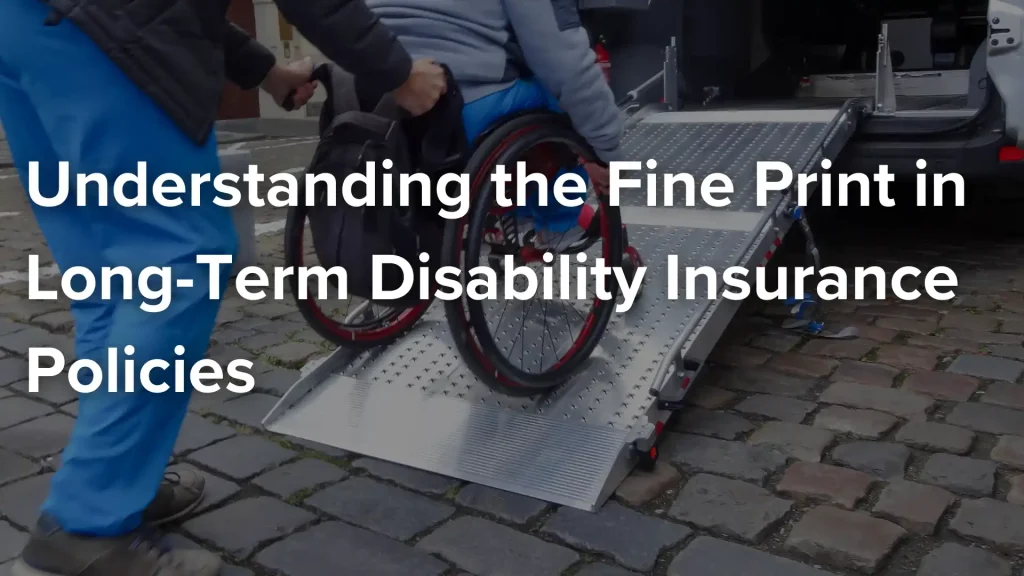Posted on Thursday, May 22nd, 2025 at 9:00 am
 As expected, Pennsylvania long-term disability insurance needs policies involve lengthy, detailed contracts. Unfortunately, you can’t merely skim your policy documents. Understanding the fine print is crucial for your case, particularly if your insurer denies your disability claim or tries to reduce your benefits.
As expected, Pennsylvania long-term disability insurance needs policies involve lengthy, detailed contracts. Unfortunately, you can’t merely skim your policy documents. Understanding the fine print is crucial for your case, particularly if your insurer denies your disability claim or tries to reduce your benefits.
How Long-Term Disability Insurance Works
Long-term disability (LTD) insurance provides income if you can’t work due to a severe illness or injury. It replaces some of your lost wages while you can’t do your job.
These policies provide financial security during long periods of disability, often for months or years. For added protection, many people explore supplemental insurance options, which can help cover gaps left by standard long-term disability plans and offer extra peace of mind.
Most LTD plans pay a percentage of your regular income, usually around 50 to 70 percent. Payments typically begin after a waiting period, often 90 to 180 days after you can’t work. You must meet the insurance company’s disability definition to qualify for benefits. Some policies use an “own occupation” standard, while others use “any occupation.”
To receive long-term disability benefits, you must prove that your condition prevents you from working. This process requires thorough medical records, support from your doctor, and sometimes additional evaluations from your insurer. Once you submit your claim, the insurance company will review it, and they may ask for updates over time.
The specific terms of LTD policies vary widely. Some cover mental health conditions, while others exclude them. Some offer cost-of-living adjustments to maintain earning power over time or rehabilitation support to help you find a new career. Others have strict time limits or restrictions on certain conditions, affecting your ability to get approved. You need to know about these kinds of claims in advance so you’re not caught off guard when it’s time to file for benefits.
Types of Long-Term Disability Insurance Policies
Long-term disability policies come in several forms, each with specific rules, benefits, and limitations. Here are the primary policy types to know:
- Group LTD Policies – These policies are often part of an employer’s benefit package. They typically cost less but usually have more limits and stricter definitions of disability. You may lose coverage if you leave your job unless the policy offers a conversion option. (A conversion option lets you switch your group policy to an individual plan – usually out of pocket – if you quit your job.)
- Individual LTD Policies – As the name suggests, you can buy an individual LTD policy independently. These policies usually offer stronger protections and stay with you even if you change jobs. Individual policies may also have more flexible terms and fewer exclusions.
- Own Occupation Policies – “Own occupation” LTD policies cover you if you can’t do your specific job, even if you can work in another field. They offer broader protection, particularly for skilled professionals.
- Any Occupation Policies – An “any occupation” policy only pays if you can’t work in any reasonable job. They are harder to qualify for and often replace “own occupation” policies after a set period.
Key Provisions to Understand in Long-Term Disability Insurance Policies
 There are some other essential provisions and concepts to know regarding long-term disability insurance policies, such as:
There are some other essential provisions and concepts to know regarding long-term disability insurance policies, such as:
- Elimination Period – This is the waiting period between when you become disabled and when your LTD benefits begin. It usually lasts 90 to 180 days. You won’t receive benefits during this time, so plan carefully to avoid financial stress.
- Maximum Benefit Period – The maximum benefit period defines how long your benefits will last. Some policies pay for a set number of years, while others cover you until you reach retirement age. Certain conditions, such as mental illnesses, may have shorter limits.
- Pre-Existing Condition Clause – A pre-existing condition clause could mean that your insurer will deny coverage for conditions you had before the policy started. Insurers usually check your medical history for a set “look-back” period, often three to 12 months before your coverage begins.
- Cost-of-Living Adjustment (COLA) – A COLA increases your monthly benefit over time to help keep up with inflation. Not all policies include this provision; your benefits could lose their spending power over time without one. Some companies offer a COLA as an addition that raises your premium but protects your buying power long-term.
- Limitations and Exclusions – LTD policies often exclude long-term disability coverage for certain conditions, like self-inflicted injuries or disabilities related to substance abuse. Some insurers also place time limits on benefits for these issues, even if you still can’t work.
Contact Our Pittsburgh Long-Term Disability Insurance Lawyers Now
Long-term disability insurance in Pennsylvania policies can be challenging to understand, and asking for help is okay. Capitan Law focuses solely on these cases and can explain your policy in plain terms. Our team can also help you apply for benefits or appeal a denied claim. Call (267) 419-7888 now or complete our contact form for a free consultation.
Related Post
Why Choose Our Cigna Long Term Disability Insurance Lawyers?